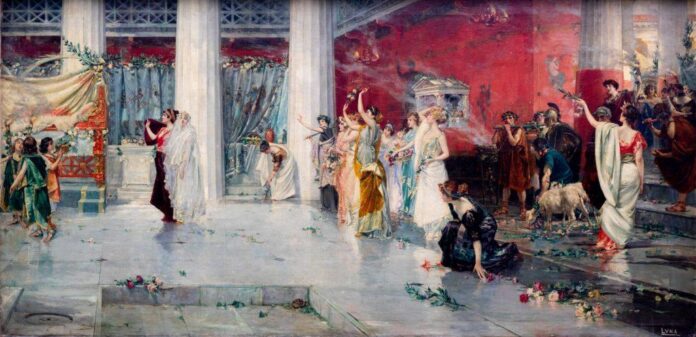A long-lost masterpiece by the celebrated Filipino painter and national hero Juan Luna has been unveiled at the Ayala Museum in the city of Makati to mark the 125th anniversary of the Philippines’ independence. It is the first time it has been seen in public in over 130 years.
, also known as , was started by Luna in 1886 and finished in Venice in 1887. It depicts the moment a bride enters her groom’s house during an ancient Roman wedding.
The painting’s first and final public outing, at least until now, was at the Exposition Universelle in Paris in 1889, where it was awarded a bronze medal. Soon after, it entered a private collection and never resurfaced, living on only in public memory.
Relocating the legendary artwork became an obsession for Jamie Ponce de Leon, a collector and dealer who founded León Gallery in Makati in 2010. It took him almost a decade, but after searching across Europe he was finally able to acquire the work in 2014.
The painting is now enjoying its second major public debut as the star of Ayala Museum’s new single-work show “Splendor: Juan Luna, Painter as Hero,” which runs through December 30, 2023. The work is situated within an immersive, multimedia exhibition designed by scenographer Gino Gonzales, which aims to tell the artist’s life story, explore his diasporic experiences and celebrate his enduring importance for Filipino nationalism.
The choice of a painting by Luna to celebrate independence is particularly pertinent because the artist was himself a political activist involved with the Philippine Revolution in the 1890s. After joining the Katipunan rebel army, he was arrested and imprisoned by Spanish authorities in 1896. Two years later, the Philippine revolutionary government appointed him to advocate internationally for recognition of the Philippine Republic.
A decade earlier, Luna was busy painting , and his interest in the subject may have reflected his own nuptials to his wife María de la Paz Pardo de Tavera in 1886. The couple settled in Paris, but in a fit of jealousy Luna eventually shot and killed Paz and his mother-in-law. He was acquitted of murder charges in 1893, after the incident was dismissed as a crime of passion.

























